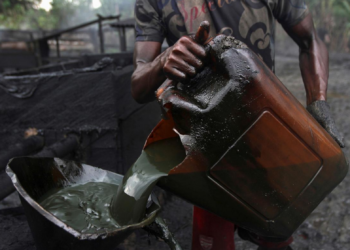Nigeria is Africa’s largest crude oil exporter and ranks among the top ten exporters in the world. The country’s economy remains heavily reliant on its oil sector as it is the main source of both government revenue and foreign exchange. Petroleum export accounts for c.70%-80% of revenues with several transmission channels into incomes and economic output.
Although the government has introduced a few policies in past years to diversify the Nigerian economy from its reliance on oil, the intended outcomes of those policies are yet to materialise- leaving the economy at the mercy of the volatile oil sector. Interestingly, the oil sector that wields so much power on the economy constitutes just about 9%-10% of the countryís GDP.
The Nigerian oil sector is no stranger to fire outbreaks, theft and sabotage from the Niger-Delta militia. The disgruntled militia in the Niger-Delta region often resort to vandalism as a way of getting government’s attention which ends up sabotaging the country’s economic progress. In 2016, one of such malicious attacks, alongside the slump in global oil prices, forced the country into its deepest economic downturn in over 30 years as the country’s crude output fell sharply from a peak of 2.2 million barrels per day (mbpd) to near 1 mbpd.

Recently, the operator of one of the country’s major oilfields, Aiteo, disclosed to Reuters that attacks on the Nembe Creek Trunkline ñ which produces about 150k bpd ñ resulted in the trunkline being shut down for 61 days this year. The Nembe Creek Trunkline, one of two that exports Bonny Light crude oil, has been shut down twice this year- once in April and the other in September.
The operator also added that over the last four years, more than 200 days of shut down have been recorded. The pipeline attacks have resulted in losses in crude production, culminating in deficits in revenue to all stakeholders- including the government who appears to be in desperate need of revenues to bridge its rising fiscal deficits.
[READ MORE: Headline inflation jumps to 11.61% in October on border closure]
Naturally, mono-product economies are exposed to fluctuations in the prices of underlying commodities. Often, the proceeds during periods of high prices are poorly managed, leaving weak buffers to cover periods of downturn in such commodity prices.
In our opinion, we believe reforms geared towards improving non-oil revenues are urgently required in improving fiscal buffers, strengthening domestic stability and insulating the economy from volatilities in crude oil prices. Looking ahead, we think the continued uncertainty around domestic crude production combined with the somewhat bleak outlook for global oil price in the long term should be a source of concern for policy-makers.
________________________________________________________________________
CSL STOCKBROKERS LIMITED CSL Stockbrokers,
Member of the Nigerian Stock Exchange,
First City Plaza, 44 Marina,
PO Box 9117,
Lagos State,
NIGERIA.


















